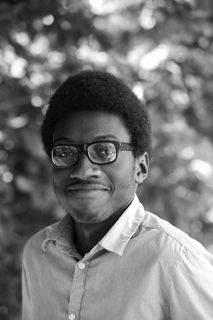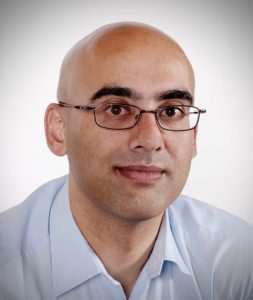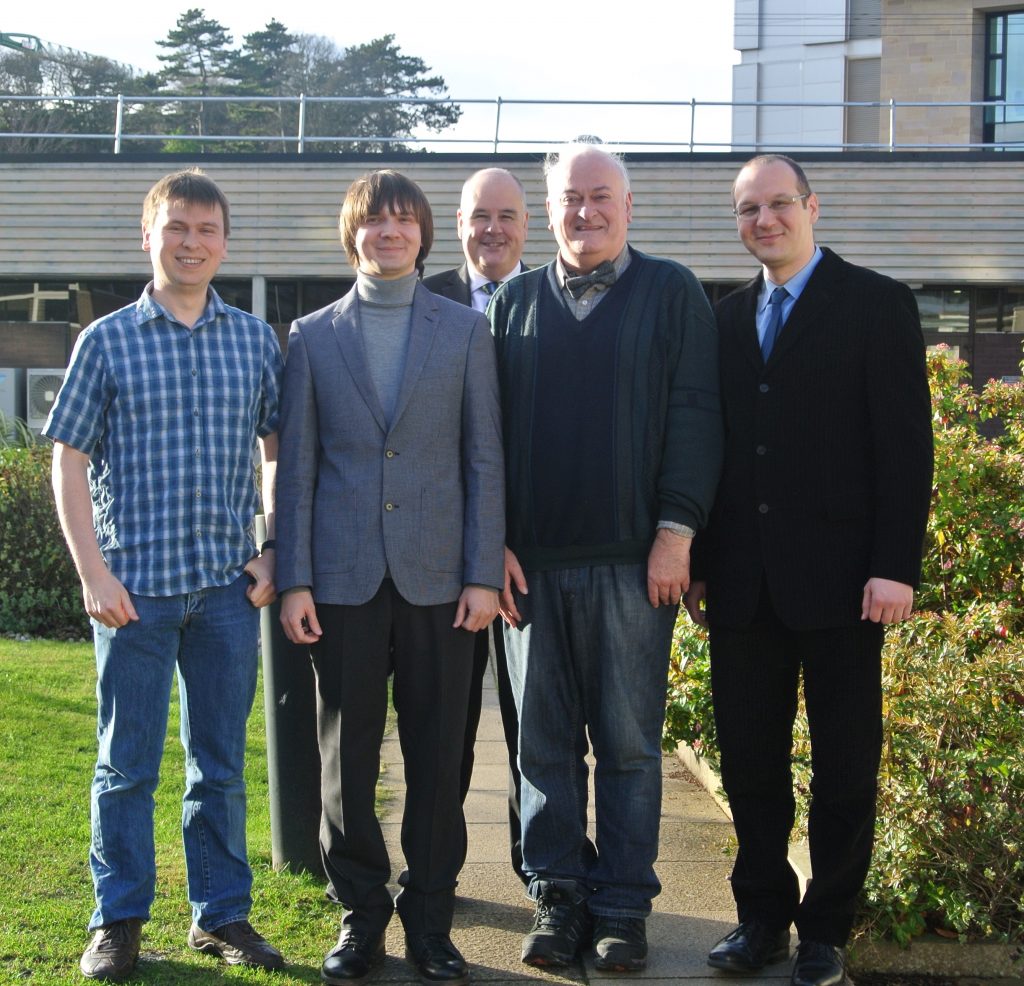Dr Tristan Henderson has a St Leonards interdisciplinary PhD studentship available, to be co-supervised by Professor Kirstie Ball of the School of Management. The area of study is to do with ethical values and data science. The student will be part of CRISP (Centre for Research into Information, Surveillance & Privacy), a collaborative research centre involving St Andrews, Edinburgh and Stirling. As an interdisciplinary project, we welcome and will consider applications from students with a wide variety of backgrounds, from computer science to management to technology law and anything in between. More details can be found on the CRISP website.
Impact Talk: Xelect Ltd
This is Impact talk as a “brown bag lunch” (i.e. you bring your lunch if you wish) and the school will provide cakes.
Xelect Ltd
– a successful spin-out from the University of St Andrews
 Xelect was founded 5 years ago by Professor Ian Johnston and Dr Tom Ashton to provide genetic services to the global aquaculture industry. The company built on several decades of research in fish physiology and genetics which was funded by BBSRC through to the stage of commercialisation. Xelect develops genetic selection technology and provides associated laboratory support to breeders of finfish, shellfish and shrimps and to date has served 52 customers in 17 countries. We currently manage broodstock genetics programs for producers in Chile, Scotland (Atlantic salmon), Croatia, Greece (seabass and sea bream), New Zealand (King salmon) and Vietnam (Barramundi). The company started out in incubation space at the Scottish Oceans Institute before moving to independent premises in 2016. Xelect also has sales offices in Puerto Montt, Chile and in Hong Kong. The company employs 12 people, mostly PhDs, and is account managed by Scottish Enterprise. Xelect’s shareholders are the founders, the University, SalmoBreed A/S and the EOS Technology Investment Syndicate.
Xelect was founded 5 years ago by Professor Ian Johnston and Dr Tom Ashton to provide genetic services to the global aquaculture industry. The company built on several decades of research in fish physiology and genetics which was funded by BBSRC through to the stage of commercialisation. Xelect develops genetic selection technology and provides associated laboratory support to breeders of finfish, shellfish and shrimps and to date has served 52 customers in 17 countries. We currently manage broodstock genetics programs for producers in Chile, Scotland (Atlantic salmon), Croatia, Greece (seabass and sea bream), New Zealand (King salmon) and Vietnam (Barramundi). The company started out in incubation space at the Scottish Oceans Institute before moving to independent premises in 2016. Xelect also has sales offices in Puerto Montt, Chile and in Hong Kong. The company employs 12 people, mostly PhDs, and is account managed by Scottish Enterprise. Xelect’s shareholders are the founders, the University, SalmoBreed A/S and the EOS Technology Investment Syndicate.
About Ian Johnston
Ian Johnston is former Chandos Professor, Head of the School of Biology and Director of the Scottish Oceans Institute. He currently works full-time for Xelect but retains a 0 FTE position as Professor of Biology.
Event details
- When: 8th February 2018 13:00 - 14:00
- Where: Cole 1.33a
- Format: Seminar, Talk
Simplifying ARM concurrency – Prof. Susmit Sarkar
ARM has a relaxed memory model, previously specified in informal prose for ARMv7 and ARMv8. Over time, and partly due to work building formal semantics for ARM concurrency, it has become clear that some of the complexity of the model is not justified by the potential benefits. In
particular, the model was originally non-multicopy-atomic: writes could
become visible to some other threads before becoming visible to all —
but this has not been exploited in production implementations, the
corresponding potential hardware optimisations are thought to have
insufficient benefits in the ARM context, and it gives rise to subtle
complications when combined with other ARMv8 features. The ARMv8
architecture has therefore been revised: it now has a multicopy-atomic
model. It has also been simplified in other respects, including more
straightforward notions of dependency, and the architecture now includes
a formal concurrency model.
This is work presented in POPL this year. I will also present some of
the background and context on relaxed memory which is absent from the
necessarily compressed talk format of POPL.
Event details
- When: 22nd February 2018 12:00 - 13:00
- Where: Cole 1.33a
- Format: Talk
Computer Science student launches UK-wide app: Shrowze.

“The Human Personal Assistant you summon by text”
Computer Science student Nnamdi Ekwe-Ekwe launches a UK-wide app today, that frees up your time to do what you want to do rather than what you have to do. Shrowze is an app that provides everyone with their own human personal assistant to help them with whatever they need to do. It is the Human Personal Assistant you summon by text.
Nnamdi a PhD student in the School, built Shrowze in response to how long he saw it took people (himself included) to complete tasks that should be simple and straightforward (such as finding accommodation, booking a flight, organising and booking a meal, getting a plumber, etc.)
Nnamdi notes,
“As a full-time student I’ve always wanted to have more time for myself and concentrate on the truly important things, while not neglecting the numerous commitments I have every day – a problem shared by millions the world over. I just remember spending lots of time on routine everyday things that needed doing, when instead I could have been spending my time more usefully.”
With Shrowze, whatever it is you need doing, whatever it is you need getting, from wherever in the world, their team of human personal assistants can help – all you have to do is send a text. Shrowze has been trialed over the past 6 months with the general public and with students, receiving great feedback.
“Hi, I’m looking for accommodation for next year. This is my budget, and it’s going to be 4 of us sharing. Can you give us some potential places and book us viewings?”
“Hi, can you find me cheap flights to Barcelona for next week? And accommodation, and also give me a list of things to do there?”
“Hi, can you book me the best but cheapest taxi to the station? Three of us are going, we have two pieces of luggage!”
Shrowze is now live for all users across the country. For the next two weeks, anybody who signs up with Shrowze, will get 1 hour free time to have access to their own human personal assistant. Additionally, all students get a special 50% discount for as long as they are a student to use Shrowze.
Website – https://www.shrowze.co.uk/
Nnamdi Ekwe-Ekwe completed his undergraduate degree at the University of Leicester before studying for his Masters in Advanced Computer Science at the University of St Andrews and is currently a PhD student with a focus on Cloud Computing.
Text and images courtesy of Darcy Roberts, Communications Team, Shrowze and Nnamdi.
DLS: Functional Foundations for Operating Systems
Biography: Dr. Anil Madhavapeddy is a University Lecturer at the Cambridge Computer Laboratory, and a Fellow of Pembroke College where he is Director of Studies for Computer Science. He has worked in industry (NetApp, Citrix, Intel), academia (Cambridge, Imperial, UCLA) and startups (XenSource, Unikernel Systems, Docker) over the past two decades. At Cambridge, he directs the OCaml Labs research group which delves into the intersection of functional programming and systems, and is a maintainer on many open source projects such as OpenBSD, OCaml, Xen and Docker.
Timetable
9:30: Introduction by Professor Saleem Bhatti
9:35: Lecture 1
10:35: Break with tea and coffee
11:15: Lecture 2
12:15: Lunch (not provided)
14:00: Lecture 3
15:00: Close by Professor Simon Dobson
Lecture 1: Rebuilding Operating Systems with Functional Principles
The software stacks that we deploy across computing devices in the world are based on shaky foundations. Millions of lines of C code crammed into monolithic operating system kernels, mixed with layers of scheduling logic, wrapped in a hypervisor, and served with a dose of nominal security checking on the side. In this talk, I will describe an alternative approach to constructing reliable, specialised systems with a familiar developer experience. We will use modular functional programming to build several services such as a secure web server that have no reliance on conventional operating systems, and explain how to express their logic in a high level, functional fashion. By the end of it, everyone in the audience should be able to build their own so-called unikernels!
Lecture 2: The First Billion Real Deployments of Unikernels
Unikernels offer a path to a more sane basis for driving applications on hardware, but will they ever be adopted for real? For the past fifteen years, an intrepid group of adventurers have been developing the MirageOS application stack in the OCaml programming language. Along the way, it has been deployed in many unusual industrial situations that I will describe in this talk, starting with the Docker container stack, then moving onto the Xen hypervisor that drives billions of servers worldwide. I will explain the challenges of using functional programming in industry, but also the rewards of seeing successful deployments quietly working in mission-critical areas of systems software.
Lecture 3: Programming the Next Trillion Embedded Devices
The unikernel approach of compiling highly specialised applications from high-level source code is perfectly suited to programming the trillions of embedded devices that are making their way around the world. However, this raises new challenges from a programming language perspective: how can we run on a spectrum of devices from the very tiny (with just kilobytes of RAM) to specialised hardware? I will describe the new frontier of functional metaprogramming (programs which generate more programs) that we are using to compile a single application to many heterogenous devices, and a Git-like model to coordinate across thousands of nodes. I will conclude with by motivating the need for a next-generation operating system to power new exciting applications such as augmented and virtual reality in our situated environments, and remove the need for constant centralised coordination via the Internet.
Event details
- When: 13th February 2018 09:30 - 15:15
- Where: Byre Theatre
- Series: Distinguished Lectures Series, Systems Seminars Series
- Format: Distinguished lecture
PhD viva success: Alexander Murashko
Congratulations to Alexander Murashko, who successfully defended his thesis last week. Alexander is pictured with External Examiner, Professor Paul McKevitt from Ulster University, Internal Examiner Dr Kasim Terzic, Convener Professor Alan Dearle and Supervisor Dr John Thomson.
Image courtesy of Annemarie Paton.
Matthew Rice (Open Rights Group): Do we need the Third Sector in the debate about technology and ethics? (School Seminar)
Abstract:
Matthew Rice, Scotland Director for the Open Rights Group, the digital rights campaigning organisation, will lead a seminar discussing the role of civil society organisations in the discourse of technology, rights, regulation, and norms. Computer Scientists sit at an important point in this debate, as individuals affected by changes in norms, but more importantly as builders of the applications and the infrastructure that reflect these norms.
The seminar will discuss the impact civil society has on changing norms and laws around the world, and why these actors matter in the space between governments, companies, and wider society. It will introduce students to the Open Rights Group, the UK’s only technology and human rights grassroots campaigning organisation on t, and its current work in the area of technology and human rights.
Digital technology has transformed the way we live and opened up limitless new ways to communicate, connect, share and learn across the world. But for all the benefits, technological developments have created new threats to our human rights. The Open Rights Group raise awareness of these threats and challenge them through public campaigns, legal actions, policy interventions and tech projects.
Event details
- When: 1st May 2018 14:00 - 15:00
- Where: Cole 1.33a
- Series: School Seminar Series
- Format: Seminar
Arnau Erola (Oxford): Corporate Insider Threat Detection (School Seminar)
Abstract:
It is widely recognised that the threat to enterprises from insider activities is increasing, and that significant costs are being incurred. Since insider threat and compromising actions can take a multitude of forms, there is a diverse experience and understanding of what insider threats are, and how to detect or prevent them. We investigate the potential for detection of insider threat activities within a large enterprise environment using monitoring tools centred around the information infrastructure. In this seminar we will review our experiences and lessons learnt from the implementation and trial of the Corporate Insider Threat Detection (CITD) tool in real organizations, not only from a technical perspective, but also from the legal and ethical aspects.
Speaker Bio:
Dr Arnau Erola is a cyber security expert with strong background in data analytics, machine learning, data mining and information privacy. He is currently a Research Fellow at the Cyber Analytics group of Oxford University, working on enterprise security, defence systems and better understanding the cyber-threat landscape. Dr Erola holds a Ph. D., M. Sc. and B.Sc. in Computer Science from the Rovira i Virgili University of Tarragona (URV). He is author of several international journal articles on online privacy, anonymity protocols and intrusion detection mechanisms.
Event details
- When: 24th April 2018 14:00 - 15:00
- Where: Cole 1.33a
- Series: School Seminar Series
- Format: Seminar
Jan Kofroň (Charles University) School Seminar
Abstract TBD
Event details
- When: 14:00 - 15:00
- Where: Cole 1.33a
- Series: School Seminar Series
- Format: Seminar
Elliott Brooks (The HUT Group): Technology at The HUT Group (School Seminar)
Abstract:
The HUT Group have a variety of engineering, UX and data science teams solving real-world customer and logistics problems. This presentation looks at a variety of solutions applied across the business, from continuous release processes to warehouse layout approaches.
Speaker Bio:
Elliott graduated from CS at St Andrews in 2016, and now works within the research and development team at THG.
Event details
- When: 3rd April 2018 14:00 - 15:00
- Where: Cole 1.33a
- Series: School Seminar Series
- Format: Seminar




